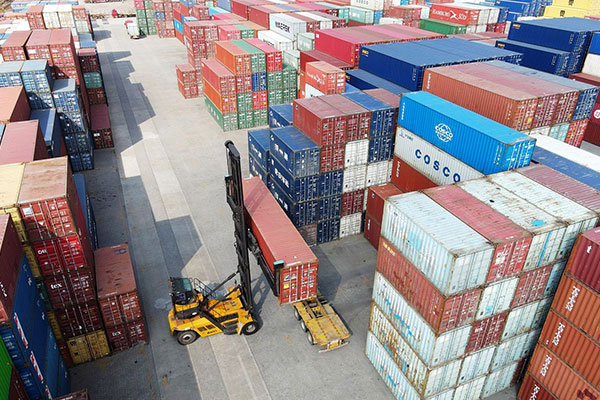- Shanghai Zhongshen International Trading Co., Ltd. – Your reliable partner with 20 years of import/export agency service expertise.

I. The Import Trade Situation and Market Opportunities of Italian Cakes
In recent years, China's imported food market has continued to expand. According to customs data for 2023, the import value of baked goods increased by 18.7% year-on-year. Among them, Italian cakes, with their labels of "handmade" and "high-quality ingredients", account for more than 23% of the high-end baked goods market. This trend is attributed toChina-Europe Railway ExpressNormalized operation (with a total of 16,000 train runs in 2023), the entry into force of the China-EU Geographical Indications Agreement (protecting 114 Italian geographical indication products), and the pursuit of "country-of-origin quality" driven by domestic consumption upgrading.
However, it should be noted that the European Union imposes strict EC 852/2004 (Food Hygiene Regulation) on food exports, and Chinese customs has simultaneously strengthened the supervision of imported food. In 2023, the number of cases of returned shipments due to non-compliance with documentation and labeling requirements increased by 12% compared with the previous year. Against this backdrop, professionalImport Agent ServicesThe importance of services is becoming increasingly evident. Its core value lies in reducing customs clearance risks and shortening delivery cycles through document compliance and precise logistics control.
II. Core services of import agency: document processing and full-chain logistics management
(I) Document processing: Compliance is the "passport" for customs clearance.
The import of Italian cakes involves more than 10 types of key documents. The agent needs to participate in the review and preparation of these documents throughout the entire process to ensure that "all documents are consistent with each other and with the actual goods".
- Basic Commercial DocumentsBusiness invoice (which must specify the FOB price, freight charges, and insurance premiums in detail), packing list (listing the net/gross weight of each box and specifications), and bill of lading.Maritime transportIt is necessary to pay attention to the qualifications of the shipping company.Air freight(It is necessary to confirm the connection between the main order and the sub-order);
- Official qualification documentsIt's issued by the Italian customs.Origin Certificate(Must comply with the China-EU Customs Cooperation and Administrative Assistance Agreement), a health certificate issued by the Italian health authorities (which must state "Complies with EC 852/2004 standards and is suitable for human consumption");
- Special additional documentsIf it is a frozen cake, a temperature control record during transportation (which must be stamped by a third-party inspection agency) is required; if it contains dairy products, an additional veterinary health certificate from the source country of the raw materials must be submitted.
The professional competence of the agent is reflected in the following aspects: Pre-reviewing the draft documents 30 days in advance, identifying potential issues such as "the consignor's name not matching the certificate of origin" and "the validity period of the health certificate covering the arrival time at the port", and avoiding customs inspections due to document defects (with an inspection rate of about 8% in 2023, and document issues accounting for 60% of the reasons for inspections).
(II) Logistics services: Precise control from "door to port" to "port to door"
Given the perishable nature of Italian cakes (with a shelf life of 3-7 days for room-temperature cakes and 6-12 months when stored at -18°C for frozen cakes), logistics solutions must be customized.
- Selection of transportation methodsCold storage containers are recommended for shipping frozen cakes (requiring the selection of shipping companies with FSA certification, and the temperature records of the containers must be uploaded to the agent's logistics system in real time); At room temperature, cakes should be shipped by air freight (with a journey time of approximately 36 hours from Milan to Shanghai, and the entire process subject to temperature control in the cargo hold);
- : Require the agent to purchase liability insurance of at least 5 million yuanUnder the CIF terms, the agent is required to purchase insurance coverage for "All Risks + Refrigerated Cargo Insurance" to cover risks such as abnormal temperatures during transportation and cargo damage (in the 2023 frozen food insurance claims case, temperature control failures accounted for 45% of the total claims).
- Domestic distributionAfter customs clearance, the agent will coordinate with a fleet of vehicles that meet cold chain qualification standards (which require holding a Road Transportation Operating License for refrigerated transport) to ensure that the temperature fluctuations during the "last mile" are ≤2℃. Additionally, a GPS real-time tracking report will be provided.
Through end-to-end logistics control, the overall delivery time can be reduced from the industry average of 35 days to 28-30 days (for sea freight) or 7-10 days (for air freight).
III. Expansion of Business with Russia: VTBConvert foreign exchange into RMB's Efficiency and Compliance Advantages
If the client is involved in the transshipment of Italian cakes through Russia (such as exporting to the Commonwealth of Independent States), or needs to settle payments through Russian banks, the agent can rely on its cooperation with VTB Bank (Russia) to provide comprehensive services, including customs clearance, tax declaration, and logistics arrangements.foreign tradeThrough long-term cooperation with banks, we provide specialized services for foreign exchange settlement.
- Policy alignmentVTB is familiar with Russia's foreign exchange control regulations (such as the restrictions on settlements with non-friendly countries imposed by Presidential Decree No. 115), and can assist in selecting direct "Ruble-RMB" settlements to circumvent the restrictions of the SWIFT system.
- Lead time improvementBy leveraging VTB's RMB clearing bank qualification, the processing time for cross-border remittances has been reduced from the traditional 7-10 days to 3-5 days.
- Exchange Rate HedgingWe provide tools such as spot foreign exchange settlement and forward exchange locking to help clients lock in costs (in 2023, the fluctuation range of the ruble against the RMB reached 15%, and exchange locking can reduce 80% of the exchange rate risk).
This service is particularly suitable for clients with a presence in the Russian market, as it not only enables them to complete settlements in compliance with regulations but also ensures the safety of their funds.
IV. Certification Tips: Explanation of Key Qualifications That Need to Be Handled by Clients Themselves
It should be clarified that our company does not directly provide product certification services, but we can assist in organizing the list of required materials. Clients need to complete the following certifications either independently or by entrusting a third-party agency:
- Chinese label filingIt must comply with GB 7718 (General Standards for the Labeling of Prepackaged Foods), and include information such as "Country of Origin: Italy" and "Name/Address of Domestic Agent". The Nutrition Facts Table must be prepared in accordance with GB 28050 (in 2023, 22% of the recalled products were due to non-compliant labeling).
- CIQ inspectionAfter arriving at the port, you need to declare to the customs and undergo sampling testing for microorganisms (such as Salmonella and E. coli) and additives (such as preservative sorbic acid, which must comply with the limits set in GB 2760). After passing the inspection, you will obtain the "Inspection and Quarantine Certificate for Imported Goods".
- Special certificationsIf the product contains halal ingredients, a HALAL certification (issued by an accredited institution in an Islamic country) must be provided. If it is an organic cake, an EU EC 834/2007 organic certification and a Chinese Certification and Accreditation Administration (CNCA) organic product certification must be provided.
It is recommended that clients initiate the certification process three months before signing the contract to avoid delays in customs clearance due to certification issues.
5. Full-process operation guide: The 9 core nodes from consultation to feedback
1. Customer Inquiry: Deeply Explore the Customer's Needs
It is necessary to clarify the type of cake (room temperature/frozen), packaging specifications (such as 12 pieces per box), storage requirements (such as -18°C freezing), target markets (such as Shanghai/Beijing), and simultaneously understand whether the client is involved in re-exporting to Russia, in order to provide a basis for customizing subsequent solutions.
2. Negotiation and signing of the contract: Review of the compliance of the contract terms
The key points to review include trade terms (recommending CIF Shanghai and clarifying insurance responsibilities) and payment methods (T/T with a 30% down payment and 70% upon receipt of the bill of lading copy, or other arrangements as needed).?L/C?(1) Letter of Credit (L/C) with a 90-day deferred payment term. (2) A quality objection period (it is recommended to raise any quality concerns within 15 days after the goods arrive at the port). (3) Avoid vague expressions such as "dealing based on the sample".
3. Order and Payment: Financial Security Assurance
The agent operates through a bank-supervised account. For T/T payments, it is necessary to verify whether the Italian supplier's bank account is consistent with the contract. Under L/C terms, it is necessary to review the credit terms (such as "the health certificate must be issued by a designated institution") to avoid "soft clauses" (such as "the buyer must confirm the quality of the goods before making payment").
4. Production supervision: Quality control at the source
If requested by the client, we can entrust a local third-party organization in Italy (such as SGS) to conduct supervision of production, with a focus on verifying the batch of raw materials (e.g., flour must be accompanied by a non-GMO certificate), the production environment (the hygiene grade of the workshop must meet ISO 22000 standards), and packaging compliance (moistureproof/shockproof measures). A "Production Supervision Report" will be issued upon completion of the inspection.
5. Logistics Management: Full-Process Visualized Tracking
For sea freight, refrigerated containers must be equipped with GPS and temperature sensors (with data synchronized to the agent system in real time); for air freight, it is necessary to confirm the flight number and estimated arrival time (ETA), and send the "pre-entry form" to the customs 24 hours in advance to strive for "priority inspection".
6. Customs Compliance: Precise Calculation of Tax Numbers and Tariffs
Accurately classify the HS code (e.g., 1905.9000 Other bread and pastries), with a Most-Favored-Nation tariff of 15% and a value-added tax of 13% in 2024. If eligible for the preferential treatment under the China-EU Geographical Indications Agreement, applicants must submit a "GI Mark Certificate" and may apply for tariff reductions (specific details subject to customs approval).
7. Delivery and Distribution: End-of-line Delivery Guarantee
Cold storage trucks at 4°C to 8°C are used to deliver room-temperature cakes, while frozen cakes are kept at -18°C throughout the delivery process. Customers are notified 30 minutes before delivery, and during on-site inspection, it is necessary to verify the consistency among the three items: the delivery note, the actual goods, and the labels. A "Receipt Confirmation Form" must be signed upon receipt of the goods.
8. Quality Assurance: Quick Response to Issues
If the test reveals that the microorganism exceeds the standard, the agent can assist in contacting the original supplier to negotiate the return of the goods (within the quality objection period) and issue a "Quality Problem Analysis Report"; if the goods are damaged during transportation, the agent will assist the client in claiming compensation from the insurance company (usually within 15 working days to complete the assessment of the damage).
9. Summarize and provide feedback: Data-driven optimization
Provide an "Import Full-Process Report", which includes a detailed breakdown of costs (such as shipping fees, customs clearance fees, and insurance premiums), timeline milestones (from factory shipment to port arrival, customs clearance, and delivery time), problem records, and improvement suggestions, to help clients optimize their next batch of import plans.
ConclusionThe core competitiveness of Italian cake imports lies in avoiding customs clearance risks through professional document processing and ensuring product quality through precise logistics control. Choosing an import agent with 20 years of experience is not only about optimizing costs, but also about effectively seizing market opportunities.
? 2025. All Rights Reserved.










